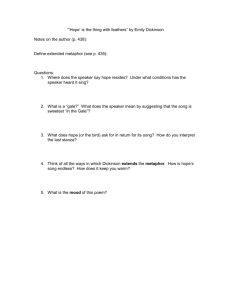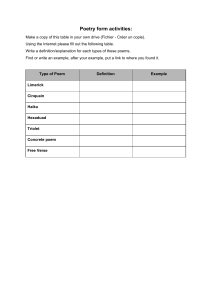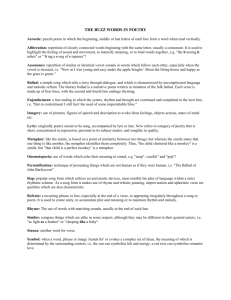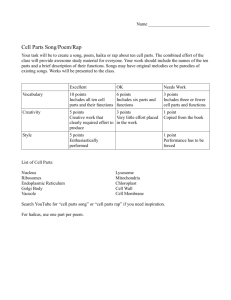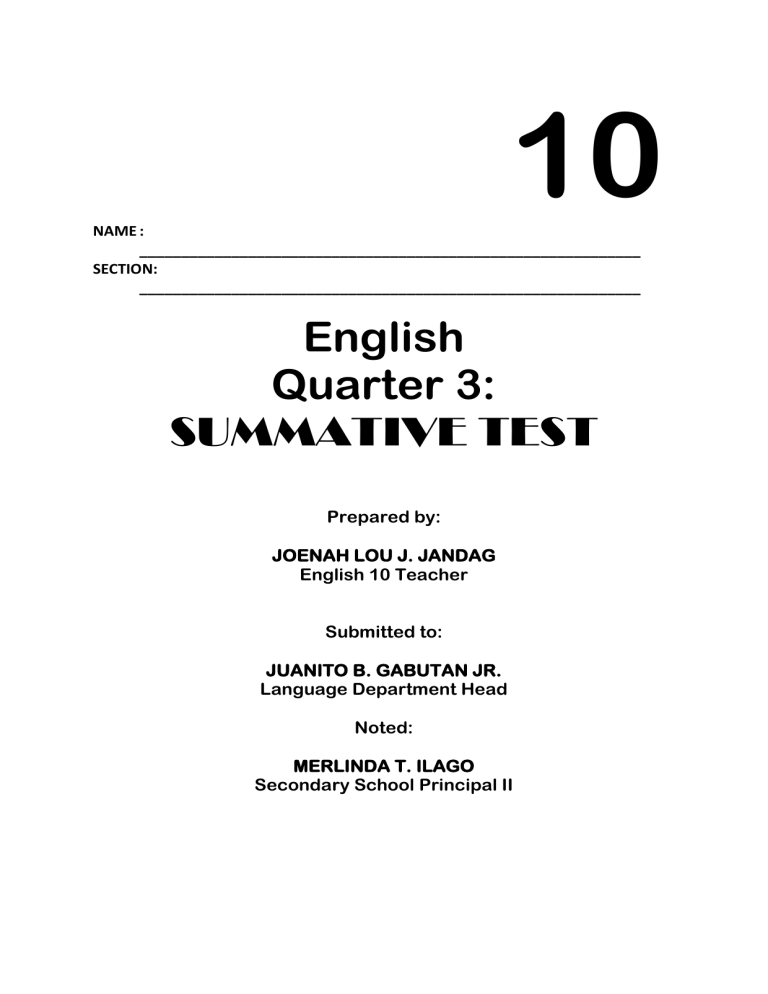
10 NAME : ____________________________________________________________ SECTION: ____________________________________________________________ English Quarter 3: SUMMATIVE TEST Prepared by: JOENAH LOU J. JANDAG English 10 Teacher Submitted to: JUANITO B. GABUTAN JR. Language Department Head Noted: MERLINDA T. ILAGO Secondary School Principal II Directions: Carefully read the questions in each item and choose the letter of the correct answer. Encircle the letter of your choice. Reminder: You only answer based on the last module you received. (Again, ayaw na ug apila ug answer ang dili inyo nga section kay for sure dili na naa checkan. Ayaw kabalaka kay kada section 15 ra ang highest score, pero kung imong answeran tanan, bahala pa ug perferct score ka, dili naa ma count, as in zero imong score kay wala ka ga follow sa instructions. As simple as that.) To note: Courteous – Module 10 Charity – Module 11 Confidence Module 12 Compassion Module 9 Module 9 – For Grade 10 – Compassion Students Only 1. Which type of poetry that has four lines, one having alternate rhymes? A. Sonnet B. Quatrain C. Haiku D. Free Verse 2. A poem consisting of 14 lines with ten syllables per line. A. Sonnet B. Haiku C. Ballad D. Free Verse 3. A couplet is a group of how many lines? A. 1 B. 3 C. 2 D. 4 4. What type of poem is the example given below? Reminder I was not happy With the rain Until my eyes caught Five wet leaves – A mysterious autumn watercolour gift Here On this broken road. -Amy Ludwig Van Derwater A. Sonnet B. Haiku C. Ballad D. Free Verse 5. This type of poem is usually about nature. A. Ballad B. Haiku C. Free Verse D. Limerick 6. This type of poem has no set rules, no rhyme or rhythm. A. Ballad B. Haiku C. Free Verse D. Limerick 7. Identify the emotions being described in the poem. I Never Saw a Purple Cow By Gelett Burgess I never saw a purple cow, I never hope to see one one. But I can tell you anyhow I’d rather see be one. A. Happy B. . Amazed C. Confused D. excited 8. A form of drama in which the events leading to the downfall of the main character. A. Comedy B. Romance C. Tragedy D. Melodrama 9. How is a play different from other kinds of fiction? A. The play has more characters than other kinds of fiction. B. The play is written to be performed by actors for an audience. C. The play has a plot other kinds of fiction used monologue instead of plot. D. Play can only have one setting. 10. How is the audience meant to respond to the scene of “Romeo and Juliet”, when the nurse meets Mercutio, Benvolio and Romeo. A. The audience should cry. B. The audience should laugh. C. The audience should stand up. D. The audience should boo. 11. The moonlight described in the balcony scene makes the mood A. scary B. frantic C. romantic D. dangerous 12. Which of the following themes is the lesson that Shakespeare MOST LIKELY wanted the audience to take from the play? A. Don’t lie to your parents B. Don’t rush into things C. Don’t hold a grudge for too long D. Don’t fall in love with your enemy 13. “O happy dagger, This is thy sheath: their rust, and let me die.” What emotion do you feel in this line? A. angry B. lonely C. sad D. desperate 14. The social function of the song is __________________. A. to entertain the listener B. to teach the moral value C. to express personal feeling D. all of the above 15. The definition of song is_____________. A. A single work of music intended to be sung by any voice with distinct and fixed pitched B. A single work of music intended to be sung by the human voice with distinct and fixed pitched and patterns using sound. C. A single work of music intended to be sung by animal and human voice using music D. None of the above Module 10 – For Grade 10 – Courteous Students Only 1. Can it fly? A. Yes,it can. B. No, it can't. 2. 3. 4. 5. 6. 7. 8. 9. 10. 11. 12. 13. 14. C. Yes, it can't. D. No, it can She's traveled a lot, ___ A. isn't she? B. hasn’t she? C. is she? D. won’t she? He doesn’t have a camera, ________________. A. has he? B. does he? C. hasn't he? D. isn't he? It is a sentence designed to get information from someone. A. Clarification B. Evaluation C. Information D. Questions The ability to do something exactly without making a mistake A. Accuracy B. Adequate information C. Effectiveness D. Validity As a student, you will be gathering information from a variety of types of sources as; A. books B. newspaper C. magazines D. All of the above It is important to evaluate each source to determine the quality of information. The following are the common tools or criteria in evaluating the source, EXCEPT______________________. A. Accuracy and Reliability B. Adequate Information C. Authority and Credibility D. Purpose and intended Audience The following are guidelines for clarification, Except ____________________. A. Ask for repetition B. Admit if you are unsure with what the speaker means C. Use open and use open and directive questions D. None of the above It is the capability of producing the desired result or the ability to produce the desired output. A. Accuracy B. Clarification C. Effectiveness D. Questions This is about doing the right things. A. Accuracy B. Clarification C. Effectiveness D. Questions Ask a question to this sentence, “ I leave for work at 7:30 every morning.” A. What time do you leave for work? B. Where did you work? C. How did you work? D. Who leaves for work? Questions that offer a choice of several options as answers are what type of questions? A. General Questions B. Special Questions C. Choice Questions D. Tag Questions Which of the following sentences describes accuracy? A. The condition of being true and correct. B. Producing a desired result. C. An ability to produce output D. Doing things in the right time Accuracy and reliability answer the following questions, EXCEPT__________. A. Are there references? B. Has the sources been edited or peer-reviewed? C. Is the current information required? D. What was the method of data collection? 15. Which of the following sentences describes effectiveness? A. It contains facts and information. B. It is the quality of being precise. C. Its main purpose is to achieve a goal. D. All of the above Module 11 – For Grade 10 – Charity Students Only 1. Which prosodic features of speech emphasizes on the giving of force or stress on a sound, syllable, or word in comparison to other sounds, syllables, or words that impact the meaning of the word or sentence? A. Intonation B. Loudness C. Pitch D. Stress 2. Among the prosody of speeches, which one refers to the rise and fall in pitch that occurs when we are speaking? A. Intonation B. Pitch C. Speed D. Rhythm 3. In emphasizing intonation, when do we usually have rising intonation? A. when we greet someone B. when we introduce someone C. when we ask a yes/no question D. when we have a declarative statement 4. Why do you think body language, posture, gestures and facial expressions have an effect in conveying the message? A. it shows the image of the speaker B. it relates to the attitude of the speaker C. it reveals the way the speaker acts on stage D. it gives extra information about a spoken language 5. What does the stressed word in the sentence mean? Nature gives us 'permit to utilize its resources. A. an ability B. an emphasis C. a notice D. a consent or permission 6. Why should you organize your speech? A. to impress the audience B. to help the audience comprehend the message C. to encourage the audience to pay attention to your speech D. Answers B and C only 7. Which image reflects the correct stage stance of a speaker? 8. Why do polite expressions matter in delivering a speech? A. It reveals the character of the speaker.t B. It exposes the way the speaker speaks. C. It shows the kind of audience listening to the speech. D. It conveys awareness and respect for the feelings of other people. 9. Which of the following statements displays politeness? A. Gather yourselves. B. Do gather yourselves. C. Come here and gather yourselves. D. Could you please, gather yourselves? 10. “I thank you for saving my life.” Which one reflects the appropriate transformation of an expression or a statement into one that shows politeness? A. I thanked you for saving my life. B. I will thank you for saving my life. C. I want to thank you for saving my life. D. I would like to thank you for saving my life. 11. Why does a eulogy speech need not belong? A. The audience does not want to listen to you anymore. B. The audience wants the speech to be done and get over with it. C. Relating the whole life story of the one given a eulogy with could be monotonous and it gets on the audience short attention span. D. You do not want to overwhelm those in attendance with longer speech; you just have to be honest with your feelings and thoughts. 12. Which particular occasion speech evokes public proclamations that include ridicule or criticizes someone to honor them, meant to poke fun at the guest of honor considering a balance between what is funny and insulting? A. Eulogy B. Closing Remarks C. Roast Speech D. Toast Speech 13. What is the unique feature of a Roast speech? A. it uses personal pronouns B. it includes the life story of the person given the honor C. it includes happy moments with the one given honor D. the use of the polite expression as one poke fun of the one given honor without hurting feelings 14. Why is the application of vocal (voice) variety in delivering speech important? A. The use of vocal variety gives an impression to the audience. B. The use of vocal variety reflects the speaking ability of the speaker. C. The use of volume, pitch, appropriate pauses and quality of voice reflect, add meaning, and interest to the message. D. The use of volume, pitch, appropriate pauses and quality of voice in speech delivery could not affect the meaning and interest of the message. 15. How would you change the direct statement into indirect or reported speech? He said, “I work in a poultry farm”. A. He said, he worked in a poultry farm. B. He said that he works in a poultry farm. C. He said that he worked in a poultry farm. D. He said, “he was working in a poultry farm Module 12 – For Grade 10 – Confidence Students Only (Based from the song entitled “Earth Song” by Michael Jackson) 1. What does this stanza mean? Did you ever stop to notice All the blood we've shed before Did you ever stop to notice This crying earth, these weeping shores A. B. C. D. The earth is telling men to stop abusing it. The earth is begging for men to take care of it. The earth is showing how men damaged it. The earth is expressing that men should be aware of the earth’s present condition. 2. What can you infer from the underlined line of the song? A. The earth is seeking help. B. The earth is saying it is crying. C. The earth is revealing its true nature. D. The earth is showing its present condition being destroyed by men. 3. What is the tone or mood of the song? A. angry B. anxious C. happy D. sad A Illustrated by Royjade Vallente B This picture was taken by the writer. 4. What does Figure A show? A. a picture of forestland B. a picture of deforestation C. a picture of man’s abuse to nature D. a contrast of what happens to the forestland due to man’s destruction 5. What kind of pollution is depicted in Figure B? A. land pollution B. water pollution C. recycling pollution D. biodegradable pollution 6. Are there people in the world foolish enough to die because leaves fall from an old vine? Why do you permit such silly ideas to her? What does the underlined word mean? A. learned B. senseless C. serious D. wise 7. Mr. Behrman had drawn his most awaited art masterpiece. What does the underlined word mean? A. excellent work B. outstanding art C. well-known piece of art D. a work of outstanding artistry, skill, or workmanship 8. What type of conflict in the story that depicts the struggle of the character within himself of herself? A. external B. internal C. man vs. nature D. man vs. man 9. What type of conflict is shown when a character struggles between himself and the forces of nature? A. man vs. nature B. man vs. man C. man vs. himself D. man vs. society 10. What did the song tell you about world issues, particularly to the environment? A. It gives us awareness on how to take care of nature. B. It exposes the effects of actions done by environmentalists. C. It tells what human should do to lessen the damage it caused to nature. D. It presents the environmental issues the world is facing due to human infliction to nature and what should be done about it. For items 11-12, Read the text inside the paragraph and answer the questions below. “Well, perhaps it is a result of her fever and her general physical weakness. But when a patient begins to feel sure that she is going to die, then I subtract 50 percent from the power of medicines. If you can succeed in making her interested in something, in asking, for instance, about the latest styles in women’s clothes, then I can promise you a one-to-five chance for her instead of one-to-ten.” Excerpt from the story The Last Leaf by O. Hen 11. What conflict is revealed from the text above? A. man vs. nature B. man vs. man C. man vs. himself D. man vs. society 12. What can you infer from the underlined sentence? A. patient lacks the will to survive B. patient needs a 100% chance to survive C. patient believes the doctor can cure her D. patient needs the power of medicine to be cured 13. Which element of a short story that has something to do with what the character wants, and what is stopping him/her from getting it? A. conflict B. plot C. setting D. theme 14. What value is emphasized in the song “Earth Song” that made us realize the effects it can bring if we would not answer to nature’s call? A. Loving the Animals B. Loving the Plants C. Loving Nature C. Loving the Environment Strangely, as the cook, captain and correspondent reached the shore safely and are helped out of the water, they discovered that, somehow, the oiler, the strongest man and best swimmer, has drowned after being smashed in the surf by a huge wave. As night comes, the men still hear the pounding of the waves on the shore — the voice of the sea. Now, they understand the power of the sea and how easily it can claim even the strongest man’s life. Excerpt from the story Open Boat by Stephen Crane http://www.rdlthai.com/ellsa_openboat1.html 15. Which element of the plot reveals the story? A. climax B. denouement C. exposition viii D. rising action
